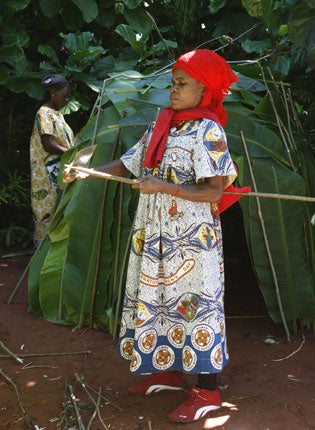Chelsea exhibit 'reveals a hatred of horticulture'

Your support helps us to tell the story
From reproductive rights to climate change to Big Tech, The Independent is on the ground when the story is developing. Whether it's investigating the financials of Elon Musk's pro-Trump PAC or producing our latest documentary, 'The A Word', which shines a light on the American women fighting for reproductive rights, we know how important it is to parse out the facts from the messaging.
At such a critical moment in US history, we need reporters on the ground. Your donation allows us to keep sending journalists to speak to both sides of the story.
The Independent is trusted by Americans across the entire political spectrum. And unlike many other quality news outlets, we choose not to lock Americans out of our reporting and analysis with paywalls. We believe quality journalism should be available to everyone, paid for by those who can afford it.
Your support makes all the difference.When you are exhibiting at the world's premier flower show you might be expected to regard gardening as one of the greater pleasures in life.
Designers will spend years planning their perfect garden for the Chelsea Flower Show and such is the popularity of the event that it is a rare year when the 157,000 tickets aren't sold out well in advance.
But for a group of Cameroonian Pygmy people taking part in the show this year, gardening is a torment rather than a pleasure. So much so that their exhibit is designed to demonstrate just how much they resent having to garden.
They have travelled to Britain to help recreate their native West African rainforest for the Royal Horticultural Society's show.
The garden was designed to show how they have been forced into growing their own food by the devastating effects of deforestation and illegal hunting.
Given the choice, they would never need to grow any plants, either to eat or to use in traditional medicines, but they have had to change their way of life and turn to cultivation simply to survive.
"We never needed to grow crops in the past," said Margerite Akom, one of the Pygmy women who have helped create the garden at Chelsea. "We got everything we needed from the forest. We could hunt animals to eat and gather plants to eat. We could also find plants we could use to make medicine. But now we have to grow food ourselves."
Pygmies of the Baka and Bagyeli communities in Cameroon are hunter-gatherer peoples who wander through the rainforests collecting what they need to live.
The destruction of the forests by loggers, miners and other commercial interests has, however, dramatically reduced the areas the Pygmies live in. Moreover, many have been displaced by mining companies.
Simultaneously, widespread and illegal bushmeat hunting has emptied the forests of the animals the tribespeople once caught to feed themselves.
Even the number of fish in the streams and rivers cascading through the forests has plummeted. Where once the Pygmies could temporarily dam a stream and catch hundreds or even thousands of fish in a morning, they are usually now limited to a handful of tiddlers.
The changes wrought on the rainforests have forced the Pygmy peoples to start cultivating many more crops than previous generations instead of picking what they needed from the trees and the forest floors.
Cassava, a root plant, and maize are the main crops the Pygmies now grow and they supplement them with plants such as bananas and ground nuts.
The crops have been replicated alongside the recreation of the tropical rainforest at Chelsea for the Royal Horticultural Society show that opens its gates to guests today.
The Pygmy women travelled from Cameroon to help create the Green & Blacks Rainforest Garden, designed by Jane Owen and Ann-Marie Powell, to highlight the threat to their traditional way of life. It is believed to be the first time in the history of Chelsea that pygmy people have taken part in creating an exhibit.
Jeanne Noah, another of the Pygmy women, said: "Mining companies have displaced many of us from where we lived in the forests. We have been displaced to live along roadsides and are in such small areas that it's difficult to grow enough food to live on.
"We were promised many advantages like schools and hospitals but we haven't had these benefits . We have lost the forest. We are losing our culture and traditions."
Mathilde Zang added: "We have to grow crops to survive but what we really want is our traditional way of life back."
Co-designer Ms Owen said: "I wanted to give the women a platform to tell the world about the threat they and the rainforest are facing. Chelsea is a platform to some of the most powerful people in the country. More FTSE 100 CEOs go to Chelsea than any other single event."
The garden is one of several exhibits at Chelsea linked to the 2010 International Year of Biodiversity, including the World Land Trust's recreation of the threatened Atlantic rainforest of South America, one of the most valuable habitats for wildlife on the globe.
Join our commenting forum
Join thought-provoking conversations, follow other Independent readers and see their replies
Comments